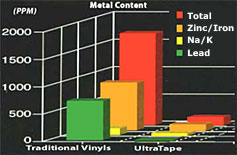Technical Tape and Label Information
UltraClean:
- Offers the highest level of cleanliness available for today's critical environments.
- Suitable for use in Class 100 to Class 1 cleanrooms.
- UltraTape's web cleaning system dissipates the static layer, allowing both sides of the label stock to be cleaned.
Classic Clean:
- Offers cleanroom packaging and is ideal for keeping products safe from environmental contamination prior to use.
- Suitable for Class 10,000 (ISO Class 7) to Class 100,000 (ISO Class 8) cleanrooms.
- No visual material transfer on Glass
- Over 24 hour at room temperature
- Acrylic (low and medium tack)
- Lowest residue over long period of time (years)
- Synthetic Rubber
- Low residue over shorter time (month)
- Natural Rubber
- Highest residue over long time

- Proprietary Manufacturing process
- Cleanroom Certified
- Particle counts (bag and pull counts)
- Standard Tape ( avg. ›100K 0.3 um )
- UltraTape CR (range ‹1 to 100 0.3 um)
- Double bagged and sealed in a Cleanroom to assure Cleanroom delivery
- Application surface
- Temperature
- Permanent vs. removable (time applied)
- Chemically resistant
- Cleanliness – particle free
- Residue Free
- Anti-Static or Conductive
- Color
- Circuit Board Masking
- Cleanroom
- Box sealing
- Plastic tenting
- Pipe wrap
- Floor marking
- ESD Tape
- Medical / pharmaceutical
- Autoclavable
- Surface Protection
- Sterilization indicator
- High Temp
Glossary Of Technical Terms:
Adhesion: (Peel Adhesion) How well the tape sticks to a surface. Usually measured in ounces of pull (force) required to remove a one-inch wide strip of tape from a steel plate (i.e., adhesion to steel). Usually measured in ounces/inches. The same tape usually adheres differently to different surfaces.
Adhesion to Backing: The force necessary to peel the tape from its own backing (i.e. to unwind the tape).
Adhesive: The most common type of adhesive is a blend of rubber and resins. Other pressure sensitive adhesives are acrylics and silicone. Acrylics are highly solvent and weather-resistant while silicones have a high resistance to heat.
Backing: The material on which the adhesive is carried (i.e., paper, cloth, film, vinyl, etc.).
Carrier: Sometimes used to refer to the backing material, particularly in double-faced pressure-sensitive tapes.
Classic Clean: Ideal for keeping products safe from excess environmental contamination. Suitable for Class 100,000 to Class 1,000 cleanrooms.
Conformability: The ability to be applied to irregular surfaces. This property is related to the elongation (stretch) of the backing.
Creeping: The ability of certain plastic tapes to shrink back to their original length after being stretched (i.e., vinyl). Also called elastic memory.
Elongation: (Ultimate) The percentage of stretch at the breaking point of the tape.
Liner: The material used between tape layers to prevent adhesion of the tape to itself—usually used for double-coated tapes.
Quick-Stick: The adhesive adheres immediately to the surface when applied. Rubber adhesive have good quick-stick properties.
Pressure-Sensitive Adhesive: A sticky substance which adheres by application of pressure alone, and does not require the use of water, heat, or solvents.
Release Coating: A thin layer of a waxy substance, which reduces the adhesion to backing (i.e. reduces the unwind strength).
Residues: Adhesive transferred from the tape to the surface applied. Heat, moisture, sunlight, reactions to the surface, creeping, tape age, and many other factors influence the potential to residue.
Tack: The property of the adhesive, which is defined by the stickiness (i.e., high-tack, medium-tack, low-tack).
Telescoping: Deformation of the roll due to the winding force exceeding the adhesion to backing. The tape roll begins looking like a “telescope”. Smaller widths telescope more than larger widths. Heat accelerates.
Tensile Strength: Force needed to break the tape, frequently expressed as oz/inch.
UltraClean: Denotes UltraTape exclusive UltraClean Certification. Suitable for Class 100 to Class 1 cleanrooms. UltraTape's web cleaning system dissipates the static layer, allowing both sides of the label stock to be cleaned.



